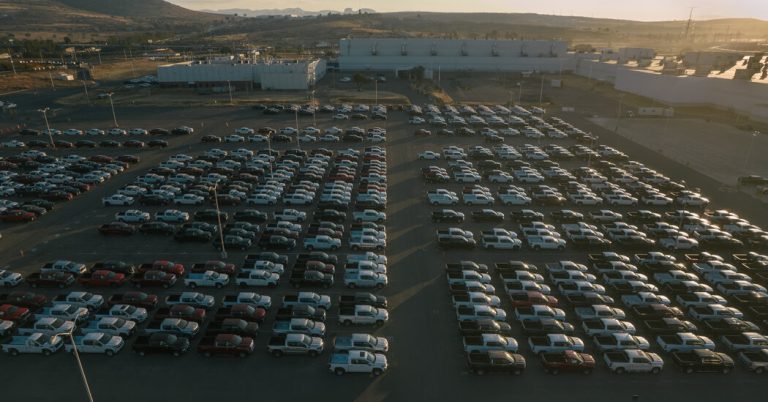Automakers ship billions of dollars worth of vehicles and parts across the US border with Canada and Mexico every day. President Trump’s plan for 25 percent tariffs on imports from these countries could seriously disrupt those operations.
On Monday, hours after his swearing in, Mr. Trump said he planned to impose the tariffs starting February 1. Now the question is whether he will follow through — or what conditions might prevent him from doing so.
“Most people in the industry are waiting to see what happens and see what management is looking for from Canada and Mexico,” Mark Wakefield, head of the global auto market at AlixPartners, a consulting firm, said on Tuesday. “Right now they’re assuming this is more of a bargaining chip than something that’s actually going to happen, more of an exercise to get people to the table.”
General Motors and Ford Motor declined to comment on the matter. Both companies produce a significant number of vehicles and parts in Canada and Mexico, and ship vehicles and parts from factories in the United States to those countries.
In theory, the tariffs would force automakers to move production to the United States and ultimately create more jobs. But redesigning cross-border supply chains, which are designed to deliver parts to car factories just hours before they are installed in vehicles, would be extremely difficult and expensive.
And in the short term, tariffs on vehicles and parts from Canada or Mexico would lead to higher prices at dealerships and lower demand for cars. Instead of protecting American auto workers, as promised by Mr. Trump, the tariffs would lead to job losses because automakers would cut their workforces to offset falling sales, analysts said.
“Ultimately, what’s happening is you’re selling fewer units and therefore needing fewer people,” said Simon Geale, executive vice president at Proxima, a supply chain consulting firm.
The impact of tariffs will depend on how steep they are and how they are implemented. A 25 percent invoice on a $5 part wouldn’t, in itself, be that big of a deal. But a 25 percent tariff on a fully assembled vehicle made in Mexico will almost immediately force a 25 percent increase in the sticker price of the same vehicle. The car industry’s profit margins are thin and they would have no choice but to pass on the cost of the tariffs to their customers.
“Tariffs will inflate car prices that many prospective buyers already believe are too high,” said Erik Gordon, a University of Michigan business professor who follows the auto industry closely. “People will keep their old cars longer. This will be good for repair shops – where dealers often make more money than selling a new car – and will put a cap on new vehicle sales and production.”
The North American auto industry has been effectively transnational for three decades, first under the North American Free Trade Agreement and as of 2020 under the United States-Mexico-Canada Agreement, a rewrite designed by Mr. Trump.
Mr. Wakefield said about $150 billion worth of vehicles move annually from Canada and Mexico across the border into the United States. Vehicles sometimes go back and forth between the United States and Canada several times during construction.
The imposition of tariffs will affect almost every vehicle produced and sold in the three countries. About half of the parts in U.S.-made vehicles, measured by value, are imported — mostly from Mexico, Canada and South Korea, according to a recent Bernstein industry analyst report.
GM produces about 25 percent of its pickups for the U.S. market in Mexico and another 15 percent in Canada. Ford makes about 12 percent of its pickups in Mexico and Canada and would be somewhat less affected. Ford builds the electric Mustang Mach E in Mexico.
Pickup trucks are among the most popular and most profitable vehicles sold by American automakers.
“The industry has been operating under the assumption that North America has been a free trade zone for decades,” said Mr. Wakefield. “A 25 percent tariff would be a substantial change for almost any manufacturer.”
Automakers had to deal with tariffs on Chinese goods during the first Trump administration and to some extent during the Biden presidency. They had time to prepare, which could soften some of the impact.
Hyundai Motor built a $7.6 billion factory complex near Savannah, Ga., in part to insulate the company from changing government policy. The decision to invest was made during the previous Trump administration, José Muñoz, chief executive of the South Korean company, said in an interview in January.
Hyundai plants in the United States source most of their supplies and components from the United States, Mr. Muñoz. “The best solution to avoid any problem is to localize your investments,” he said.




